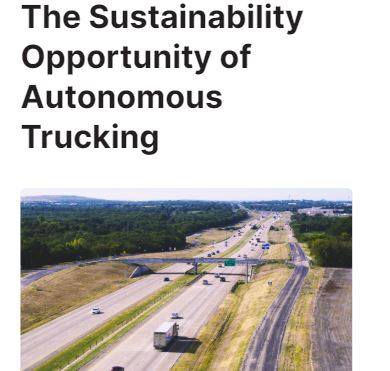Autonomous Trucks Can Reduce Emissions and Fight Climate Change
A white paper from Aurora Innovation examines how autonomous trucking technology can increase energy efficiency and reduce emissions in the freight and logistics industry
Aurora Innovation, Inc. released a white paper indicating that autonomous trucking has the potential for significant environmental benefits. The paper finds that autonomous trucking could increase energy efficiency by up to 32% relative to traditional trucking – helping the freight and logistics industry reduce emissions, meet environmental regulatory mandates, and bring down operating costs.
Transportation is a Significant Source of Emissions
Transportation makes up approximately 29% of greenhouse gas emissions in the United States and, of this, medium and heavy duty trucks account for 23%. In some freight-heavy states, this number is even greater – transportation causes approximately 50% of greenhouse gas emissions in California.
Autonomous Trucking Technology Can Help Fight Climate Change
There is a need for new technologies that reduce freight transportation’s negative impact on climate change. As Aurora advances toward driverless commercial operations, the company has examined ways to maximize the environmental benefits of autonomous trucks. The white paper identifies seven opportunities to use autonomous trucking to make freight transportation more energy efficient, including*:
- Optimizing Highway Speeds: Autonomous trucks are not limited by hours-of-service restrictions, meaning there is less incentive to drive at high speeds to reach their destination faster. This enables lower speed driving that consumes less fuel per mile. Aurora’s approach of driving 65 mph instead of 70-75 mph on the highway could reduce highway fuel consumption by 9%-17%.
- Limiting Idling: Today’s trucks often consume fuel by idling when drivers take breaks to rest, eat, or relax between hauls. This represents 4%-9% of fuel consumption. While autonomous trucks cannot completely eliminate idling, they could better maximize driving time.
- Eco-Driving: Significant automotive energy usage comes from inefficient acceleration and braking. Autonomous trucks are capable of eco-driving – strategically optimizing acceleration, braking, and coasting to increase energy efficiency and reduce fuel consumption. One study cited in the white paper found increased strategic coasting could lead to 9.5% fuel savings.
- Traffic Reduction: Because autonomous trucks can operate nearly 24 hours per day, they can shift a greater proportion of freight to off-peak driving hours. Not only would this reduce autonomous trucks’ fuel consumption by decreasing time stuck in traffic, shifting a portion of truck traffic to off-peak hours would help reduce congestion and fuel consumption for other vehicles.
Additionally, the white paper explains how the introduction of autonomous trucks into the supply chain can be a longer-term catalyst for accelerated adoption of next-generation powertrains, like battery electric and hydrogen fuel cell platforms, given the following:
- Faster Return on Investment: New powertrains will likely have higher upfront costs, and the lower operating costs and higher utilization of autonomous trucks could enable faster returns on those investments.
- Better Range Management: Because autonomous trucks are not restricted by hours-of-service limitations, they can better manage range and charging/fueling limitations of next-generation platforms.
- Fixed Routes: The fixed route model of deploying autonomous trucks supports focused installation of charging/fueling infrastructure along these routes.
Aurora is Developing Safe, Efficient, and Sustainable Autonomous Trucks
“As autonomous trucks make hauling freight safer, we have a responsibility to make logistics more sustainable as well. Self-driving technology can fight climate change by increasing energy efficiency and reducing emissions in the supply chain,” shared Garrett Bray, the author of the white paper. Bray is a Product Director at Aurora, and holds a PhD in Engineering and a Masters in Engineering for Sustainable Development from the University of Cambridge.
For carriers, autonomous trucks’ more efficient fuel consumption could reduce operating costs, and reductions in emissions would help meet federal and state environmental regulatory mandates. For more information on how Aurora prioritizes safety and efficiency, visit www.aurora.tech.
*The fuel consumption metrics for optimizing highway speeds, limiting idling, and eco-driving are not additive, and are independent of the autonomous trucking energy efficiency calculation included at the top of this press release. More information on these metrics can be found in the white paper.
Category: AUTONOMOUS, Cab, Trailer & Body, Driver Stuff, Electric Vehicles, Engines & Drivetrains, Equipment, Featured, Fleet Diagnostics & Software, Fuel & Oil, General Update, Green, News, Products, Safety, Vehicles










